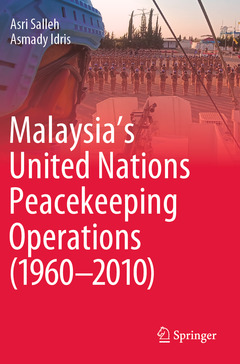Malaysia's United Nations Peacekeeping Operations (1960-2010), 1st ed. 2021
Auteurs : Salleh Asri, Idris Asmady

Small and developing states make up the majority of participants in United Nations Peacekeeping Operations (UNPKO), and Malaysia is one of these. The numerous previous studies on Malaysia?s UNPKO are primarily historical narratives which focus on practical, policy-related issues and due process, making no attempt to synchronize the nexus between theory and policy analysis. Nor do they cover the theoretical aspect which can operationalize and address the question of the roles played by Malaysia?s domestic actors (foreign policy executives, legislature, military, media, public opinion) in the respective decision-making processes as well as those of external level, such as international power politics and geopolitical considerations. In other words, they are predominantly a historical narrative of only several Malaysia?s UNPKO.
This book fills the critical gap. It deliberates on the respective national and international decision-making processes, especially from the Malaysian point of view, and analyses the theoretical and practical impacts of Malaysia?s UNPKO in understanding international politics. Apart from providing a well-researched account of Malaysia?s UNPKO across the globe for 50 years, i.e. 1960-2010, this book examines the determinants by using qualitative data, particularly key-informant interviews and documentary analysis. Thus, while most studies of Malaysia?s UNPKO single out domestic imperatives as the most vital determinant, this book, on the contrary, comprehensively identifies the prevailing world security order as the most important determinant influencing Malaysia?s UNPKO, followed by the domestic ones.
1Introduction
1.1 Introduction
1.2 Aim
1.3 Literature Review
1.4 Theoretical Framework
1.5 Scope of the Book
1.6 Structure of the Book
2Theoretical Framework
2.1 Introduction
2.2 Contending Mainstream International Relations Theories
2.2.1 Liberalism – Constructivism – Realism
2.3 Analytical Framework
2.3.1 International System and State’s Foreign Policy: A Neoclassical Realist Perspective
3 Structure and Process
3.1 Introduction
3.2 UNPKO as A Conflict-Resolution Mechanism
3.3 Malaysia’s UNPKO: Structure and Process
3.4 Malaysia’s Foreign Policy Posture vis-à-vis UNPKO
3.4 Conclusion4 Systemic-External Pressures and Malaysia’s UNPKO
4.1 Introduction
4.2 Power Rivalry vis-à-vis UNPKO
4.3 Voting Pattern of Permanent Members of UNSC via-a-vis UNPKO
4.4 Geostrategic Milieu of UNPKO4.5 Impact of UNPKO to the International System
5 Domestic-Internal Pressures and Malaysia’s UNPKO
5.1 Introduction
5.2 Malaysian Prime Ministers and Peacekeeping
5.3 Conclusion
6 Malaysia’s UNPKO in the Cold War and Post-Cold War Eras
6.1 Introduction6.2 Malaysia’s UNPKO during the Cold War and Post-Cold War Era
6.4 Conclusion
7 The Interplay of Systemic-Domestic Pressures of Malaysia’s UNPKO
7.1 Introduction
7.2 Malaysian Prime Ministers and UNPKO7.3 Conclusion
8 Conclusion
8.1. Empirical Findings
8.2. Theoretical Findings and Reflections on Neoclassical Realism Analytical Framework
8.3. Implications for Future Research
Bibliography
Appendices
On the Universiti Teknologi MARA (UiTM)
On the University Malaysia Sabah (UMS)
On the Authors
Index
Highlights the most comprehensive work on Malaysia's United Nations' Peacekeeping Operations (1960–2010)
Presents an overview of Malaysia's foreign policy
Discusses peacekeeping as a conflict resolution mechanism from a small power's perspective
Includes special focus on the mechanics of UNPKO within the Security Council of the United Nations
Date de parution : 01-2022
Ouvrage de 231 p.
15.5x23.5 cm
Disponible chez l'éditeur (délai d'approvisionnement : 15 jours).
Prix indicatif 84,39 €
Ajouter au panierDate de parution : 01-2021
Ouvrage de 231 p.
15.5x23.5 cm
Disponible chez l'éditeur (délai d'approvisionnement : 15 jours).
Prix indicatif 116,04 €
Ajouter au panier


